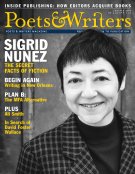A year after Brigid Hughes succeeded the late George Plimpton as editor of the Paris Review (www.parisreview.org), the magazine’s board of directors announced they would not renew her contract. Many readers who had been following the high-profile shakeup were disappointed, but they were confident that they hadn’t seen the last of Hughes’s editorial efforts. They were right. The first issue of her new quarterly literary magazine, A Public Space (www.apublicspace.org), is forthcoming this month, and will include an essay by Pulitzer Prize–winning author Marilynne Robinson and an interview with Haruki Murakami and Motoyuki Shibata, who discuss the distinctions between Japanese and American fiction, in the first installment of the magazine’s International Focus series. From her new office, located in a restored 160-year-old horse stable in downtown Brooklyn, Hughes has put together an impressive list of contributing editors that includes Richard Powers as well as Elizabeth Gaffney, the former advisory editor of the Paris Review, which is now being run by Philip Gourevitch. Hughes says she is launching the magazine, which will publish poetry, fiction, interviews, and artwork, to “encourage writers to get away from their desks and investigate what intrigues them, explore, snoop around. There are no boundaries, and we will support writers wherever they take us.”
Reading a literary magazine is a lot like attending a party. When you arrive, you’re usually greeted by the host (in an editor’s note); you encounter a throng of people (contributors), some of whom are friends, while others are complete strangers; there’s always at least one person (typically a poet) who loses all decorum and makes a spectacle of himself; and you usually leave having learned something new. In some cases there is seemingly no point to the party—other than to party, which, come to think of it, is as good a reason as any—but sometimes the revelers have been assembled for a more specific reason. The eighth issue of lyric (www.lyricreview.org), the biannual literary magazine founded by Mira Rosenthal in 2001, is definitely a party with a purpose. To find poems by the twenty-four contributors included in the special “New Polish Poetry” issue of lyric, Rosenthal spent two years researching contemporary Polish poetry as a Fulbright fellow in Krakow. The result is a collection of work that may expand readers’ understanding of the country’s poetry beyond what they’ve read by Nobel laureates Wislawa Szymborska and Czeslaw Milosz. Also included in the issue is an essay by poet and critic Kacper Bartczak, who describes the effects that political changes in the 1980s had on Polish writers, and an interview with critic Marian Stala.
In “The Fish in the Shallows,” a poem published in the debut issue of the Saranac Review (research.plattsburgh.edu/saranacreview), Ross Leckie likens a river to that most poetic of topics: “Love can be like this, the moment // of poise in the river’s flourish, the weeds / bending to the water’s insistent shove. // The way you can peer into the murk, / the way it settles over the rocks.…” He’s not the first poet to go looking for metaphors at the riverbank, nor is the Saranac Review the first literary magazine to be named after a river. (The Saranac River flows in a northeasterly direction from the Adirondack Mountains to Lake Champlain in Plattsburgh, New York, where the Saranac Review is published.) There’s the Spoon River Poetry Review (www.litline.org/spoon) at Illinois State University in Normal; Bob McCranie’s online journal Red River Review (www.redriverreview.com); the Canary (www.thecanary.org), formerly known as the Canary River Review, in Eugene, Oregon; and, taking it to an otherworldly extreme, the St. Louis–based River Styx (www.riverstyx.org), to name just a few. In her editor’s note to the first issue of the Saranac Review, which includes poems by Donald Revell, Jim Daniels, and Neil Shepard, and an excerpt from Jay Parini’s novel Deadline Fiddle, forthcoming from HarperCollins in 2007, Linda Young explains that, like the river it is named after, the annual journal “connects regions and cultures.” Indeed, one of the magazine’s objectives is to publish the work of writers living in Canada, which is conveniently located just thirty miles north of its offices in Plattsburgh.
Kevin Larimer is the senior editor of Poets & Writers Magazine.








